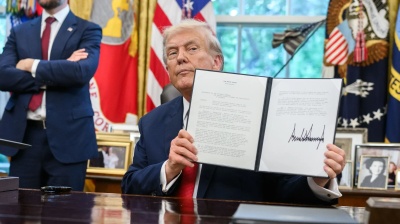Thousands of Venezuelans took to the streets in cities at home and across the globe on August 17, responding to a call from the country's political opposition to defend their claim of victory in last month's disputed presidential election against incumbent Nicolás Maduro.
The demonstrations, which spanned from Tokyo to Sydney and Mexico City, were orchestrated by the main opposition coalition to challenge the official outcome of the July 28 poll. The opposition is urging governments worldwide to back their candidate, Edmundo González, and express support for Venezuelans who fear speaking out against Maduro amid a severe crackdown.
In Caracas, opposition leader María Corina Machado – who spent the last few weeks in hiding for fear of government reprisal – addressed a crowd of thousands from a truck, declaring, "Let the world and everyone in Venezuela recognise that the president-elect is Edmundo González,” as supporters cheered and waved the national flag.
The National Electoral Council (CNE), a body stacked with Maduro loyalists, had declared the incumbent the winner with 52 percent of the vote. However, it has refused to publish detailed voting tallies to substantiate its results, which many see as fraudulent, claiming to have been hit by a cyberattack. Meanwhile, the opposition says it has access to 80 percent of paper ballots cast, showing González winning by a substantial margin.
The protests come amid a brutal repression campaign in Venezuela. Human rights NGOs report over 1,500 arrests of protesters since the election, with more than 100 teenagers charged with terrorism and facing potential 30-year prison sentences. Maduro himself has gleefully announced the construction of two brand-new megaprisons to "re-educate" opposition protesters.
Despite the risks, many Venezuelans felt compelled to participate, defying a heavy security presence. Some of them agreed to speak to bne Intellinews on condition of anonymity as they took part in the rally in the capital.
Santiago, an architect and LGBTIQ+ activist, spoke of the pervasive fear in Venezuela. "Before leaving your house, you have to delete all WhatsApp conversations, uninstall applications, and log out of social media because the military can stop you to search your phone, and if they find something they consider to be against Maduro, they will imprison you," he said.
Earlier this month, Maduro publicly urged the nation’s youth to uninstall the messaging app alleging that it “handed over the entire database of Venezuela to the extreme right.” After imposing a ban on X (formerly Twitter), he also lashed out at other social networks such as Instagram and TikTok, accused of being “in the hands of technological imperialism, enemy of Venezuela and humanity.”

Arturo, a journalist living near Petare, Caracas' largest neighbourhood and a former stronghold of Chavismo, initially hesitated but decided to join the protests after seeing the global response. "We recharge energy at these massive events. It helps us not to feel so alone and to trust that this time it will end in something positive," he said.
He reported seeing “colectivos” (armed paramilitary groups loyal to Maduro) patrolling the area in a bid to intimidate people. But “the truth is that those in government are more afraid than we are,” he added.
Maduro’s claim of victory has been rejected by the United States, the European Union, and several Latin American countries. However, recent statements from Brazil and Colombia suggesting a potential election re-run have complicated matters. Machado firmly rebuffed this idea, calling it "an insult" to the Venezuelan people and vowing to fight "to the end.”
With the opposition claiming to have compelling evidence of their victory and Maduro's government facing increasing international scrutiny as it cracks down on dissent, the coming weeks will be crucial.
"We have never, ever, felt like this in the last 25 years. That is why we say that this time is different; we just have to be patient until the end" said Jazmin, a Caracas housewife who observed the demonstrations from her window.
Her husband was arrested during the 2017 protests, and since then her family has lived in fear of retribution. Because of that, and the general crisis that has gripped the country, her eldest son had to emigrate: a moving account that resonates with over 7.7mn Venezuelans forced to flee their homeland over the last decade. Today, for the first time in years, they feel a glimmer of hope.
News

Mongolia’s PM ousted as party infighting topples government
Right to challenge sacking means battle may not be over. Observer says confrontation is linked to desire for control of country’s vast coal resources.

Ex-chairman of Istanbul-listed Sisecam hit with travel ban in Can Holding investigation
Company is controlled by "Ataturk" bank Isbank, which has previously been in the crosshairs of Turkish president Erdogan.

Ghana’s dormant TOR refinery to restart crude operations by October-end
Ghana has long struggled to translate its crude output into refined fuel security. Successive governments have pledged to revive TOR, which has faced years of debt, mismanagement, and technical breakdowns.

No Tomahawks for Ukraine, Trump to meet Putin in Hungary
The US cannot deplete its own stockpile of Tomahawk cruise missiles by supplying them to Ukraine, President Donald Trump said at a press conference on October 16 following a phone conversation with Russian President Vladimir Putin.

_Cropped.jpg)


